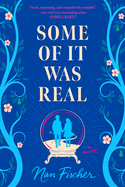
Sylvie Young has been making her living for years as a psychic-medium. But just as her star seems poised for a meteoric rise, she finds herself suddenly doubting her abilities. Enter Thomas Holmes, a journalist who's scrambling for professional redemption after a serious story error. He's determined to expose Sylvie as a fraud, especially because "grief vampires" have preyed on his widowed mother. In Some of It Was Real, Nan Fischer's (The Speed of Falling Objects) smart, thought-provoking debut for adults, Sylvie and Thomas must confront their clashing opinions on Sylvie's chosen career, as well as the buried trauma they each carry--not to mention their increasingly complex feelings for each other.
Fischer's alternating first-person narration begins with Sylvie, who has just received good news about a network TV show focused on her work. Recently, though, Sylvie's normal pre-show jitters have been ramping way up, exacerbated by her agent Lucas's insistence that she research a few audience members before every show. Lucas has been her longtime champion, but does he think she's losing her touch? Did he ever believe in her gift? Sylvie isn't sure, but Lucas's conflicting messages reflect her own increasing ambivalence about her vocation. She knows she often receives strong impressions--which are usually accurate--related to other people's relationships, dreams or troubled pasts. But behind a red barn door in her mind lurks Sylvie's own difficult childhood in Oregon, with a few dark memories she forcefully has tried to erase. When Thomas, who is avoiding some complicated memories of his own, comes to one of Sylvie's shows determined to unmask her, the two end up going on a road trip that takes them further into Sylvie's past and closer together than they'd ever imagined.
Both of Fischer's narrators draw readers in right away with their honesty: they each admit their jumbled feelings around psychics or a connection to "the beyond," not to mention their respective tangled emotions relating to family and loss. Sylvie comes off as troubled but compassionate, seeking to truly connect with her clients--ideally, to help them--rather than cheat or defraud them, as Thomas believes. For his part, Thomas has spent his life in pursuit of "the facts," following a dream that was originally his brother's rather than his own. His devotion to journalism is complicated by his mother's insistence that he step into his brother's shoes, and as he digs deeper into Sylvie's past (telling himself it's all in service to the story), he uncovers new insights about the long-ago accident that killed his brother and father.
Though both Fischer's protagonists grapple with the weight of grief and long-buried pain, their narratives contain plenty of lightness, much of it brought on by the presence of Sylvie's Great Dane, Moose, and Thomas's elderly cat, Christopher Robins. The animals give Sylvie and Thomas a neutral way to connect to each other, as well as a lighter topic of conversation than Sylvie's estranged parents or Thomas's career frustrations. The characters' banter, even under these strained circumstances, is also witty and engaging, letting readers see their growing attraction to one another. The slow-growing romance is a realistic mix of awkward and delightful, though some readers may wonder about the advisability of these two people jumping into a relationship. Sylvie and Thomas have to consciously open themselves up to a true connection; however, the heart of the book isn't the romantic will-they-won't-they plot, but the individual emotional work they both undertake.
As their search for answers propels them up the coast--to Sylvie's parents' orchard in Oregon, and toward her next show in Portland--both characters explore the gaps between their own origin stories (or the versions they were told as children) and what may have really happened. Sylvie's salt-of-the-earth orchardist parents, though reluctant (at best) to engage with their daughter, nevertheless provide some surprising insights about their adoption of Sylvie and their own personal struggles. Sylvie herself has avoided coming home for years, but gradually realizes it's not only Thomas's persistent questions that are pushing her to delve into her past. She needs to know the full truth--or the fullest version possible--before she can move on with her career and her life. Crucially, she also needs to determine which parts of her past are hers to take responsibility for, and which traumatic experiences are simply hers to accept, and to deal with however she can.
With a page-turning, breezy narrative style and layers of psychological insight, Some of It Was Real is part romance, part origin-story mystery. The novel ends up encompassing much more than psychics and journalism: readers learn about pear orchards, the foster care system and the myriad ways both trauma and joy can leave their marks on a person. The title ends up applying to the story on several levels: readers will enjoy pondering its different implications for Sylvie's work, Sylvie and Thomas's mutual attraction and the insights both of them will carry forward. --Katie Noah Gibson

